Fil-Am dedicates career to preserving Calif.’s East Bay Regional Parks
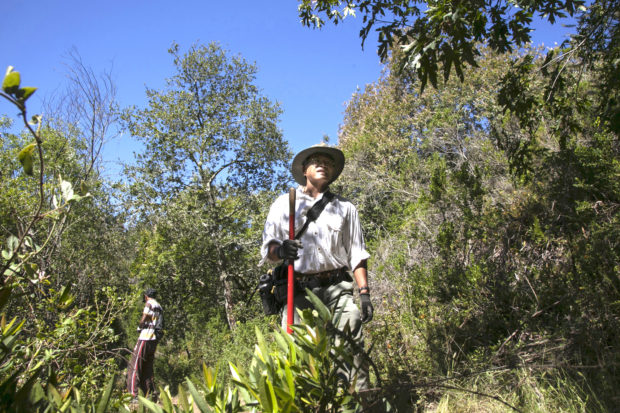
Dee Rosario has seen it all, from being groundsperson for the East Bay Parks during his younger years, to serving as fire lieutenant. In this photo at Anthony Chabot Regional Park, Dee participates in National Trail Day, one of the many community projects he’s involved in. INQUIRER/Vic Valbuena Bareng
OAKLAND, Califonia – On the first Saturday of June, Dee Rosario can be found outdoors among a crowd of hikers gearing up to stride through Redwood Regional Park.
It is National Trail Day, and Rosario dons a wide-brimmed hat, ready to set out under the sweltering summer sun. He greets 60 volunteers and 20 staff members with a smile, leading with energy and enthusiasm as director of East Bay Regional Park District’s Ward 2. With a warm welcome, they prepare to celebrate national trails through a day dedicated to park maintenance.
As Rosario would say, he’s working to bring a new day to East Bay Parks.
A passion for parks
Dee Rosario stumbled upon his lifelong passion for parks purely by accident.
He attributes his journey to the sacrifices of his parents, who came to the United States from the Philippines in pursuit of opportunity and a better life for their kids. His father served in the U.S. Army in World War II, later working as a cook for the Oakland Athletic Club and the Leamington Hotel. His mother raised eight children, sending them to schools in Oakland, San Leandro, and Hayward.
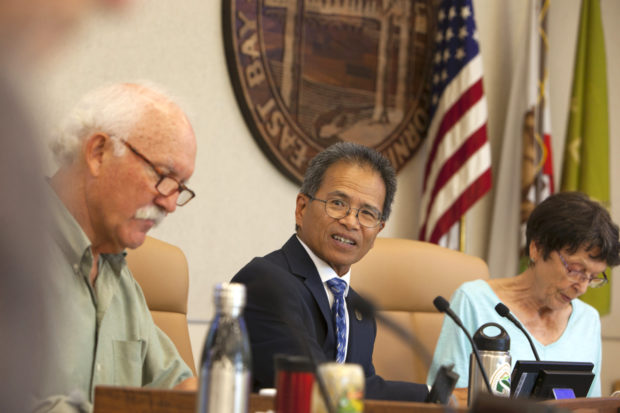
As Director of East Bay Regional Park District’s Ward 2, Dee Rosario holds a monthly public meeting with regional managers and staff members to follow up on projects in their respective communities. INQUIRER/Vic Valbuena Bareng
While a student at Cal State Hayward, Rosario held an interest in teaching, but left the CSU during his final quarter due to a family crisis. As head of the household, Rosario decided to delay his studies to find a full-time job that would support his younger siblings.
He began his career as a park grounds person in the summer of 1975. As a college student, Rosario never knew that Redwood Regional Park existed in Oakland. Witnessing the magnificence of the redwoods looming overhead was his first step on the path to becoming an integral pioneer and leader within the East Bay Regional Park District.
The temporary position became a permanent job the following year. From then on, “Working to bring a new day to East Bay Parks” became Rosario’s life work.
For more than 37 years, he has served as park ranger, park supervisor, and as fire lieutenant. In his last 17 years, he became park supervisor for the Redwood Regional Park, where he first began his career.
“I always saw my job not simply as maintaining the park, but healing the creeks, forests, meadows – bringing things back to nature,” reflects Rosario. “This is the background and philosophy I bring to the Park District Board – the perspective of someone who worked hands-on, boots on the ground for the Park District my entire career.”
Preserving East Bay Watersheds
To the surprise of many, the reputably urban Oakland area is home to flourishing regional parks and outdoor trails that extend throughout the greater East Bay.
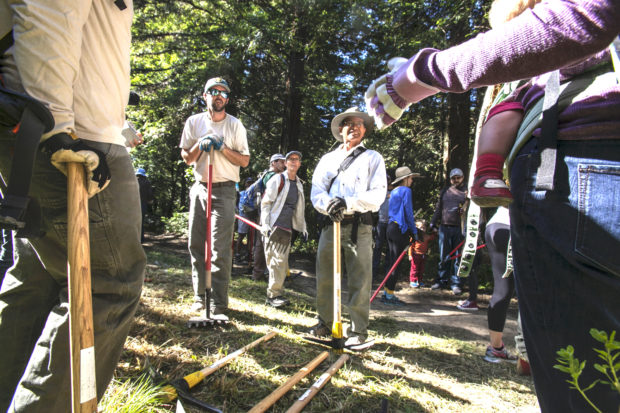
Dee Rosario at Anthony Chabot Regional Park on National Trail Day where he leads a group of volunteers to clean up the park. INQUIRER/Vic Valbuena Bareng
The East Bay stands as one of the largest regional park districts in the nation, encompassing 73 parks over 12,000 acres of land. Among its gravest environmental concerns is the health of local watersheds, which are essential components to a balanced and thriving ecosystem. Statewide, watersheds face rising global temperatures and a swiftly changing climate.
Cupping the palms of his hands, Rosario explains the role that watersheds play in supporting the park district and the communities of the East Bay. Pointing to the tops of his palms as hills, he refers to the lines of the hands streaming down the fingers as creeks, rivers, and rivulets that lead to the Bay. These are all watersheds; they are defined by their ability to capture water and lead to an outlet.
“It’s very important to maintain those watersheds, because one, they’re carbon sinks, and two, they clean out water and help clean our air,” explains Rosario. “They’re part of our ecosystem, and every ecosystem around the world.”
Erosion has been a principal challenge in maintaining East Bay watersheds. The expansiveness of the parks provides ample opportunity for water flows to work their way through multiple ridges, but creeks remain prone to natural and manmade erosion.
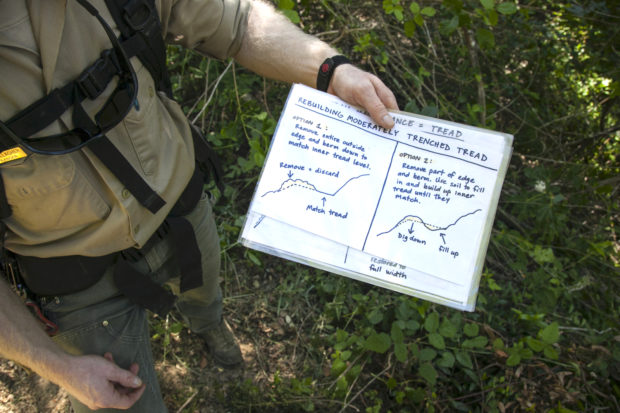
Park Ranger, Collin Gallagher holding a diagram on how to properly rebuild the trenches. INQUIRER/Vic Valbuena Bareng
In his role as a supervisor at the Redwood Regional Park, Rosario spearheaded the creation of the Resource Protection Area to reduce erosion along the entire length of the Stream Trail and subsequently restore, enhance, and protect the native rainbow trout habitat. The project entailed public negotiation and environmental education efforts that led to the building of crib walls that stabilized creek banks, re-vegetation of the banks, and fencing that set clear boundaries from pets entering trout-inhabited pools.
Rosario also points to a sediment deficit in the Bay Area as a consequence of the condition of California watersheds. The natural meandering of creeks causes erosion that can be beneficial to the Bay’s ecosystem by recruiting nutrients; however, a majority of creeks in the Bay Area tend to veer underground into narrow channels. Creeks that run underground are unable to transfer deposits of soils into the broader estuaries of the Bay, affecting the nutrients available to the Bay Area habitat.
“We are not seeing the diversity of wildlife that should be possible,” states Rosario.
In response, the East Bay Regional Park District has developed projects to rehabilitate several creeks on park lands. These include Wildcat Canyon Creek in Richmond, Redwood Creek in Oakland Hills, and San Leandro Creek, in partnership with SF Water, the Friends of San Leandro Creek, and Bay Area Rapid Transit.
Partnership has been key to maintaining the health of water ecosystems across the Bay Area. One of Rosario’s latest projects addresses the physical barriers caused by BART tracks preventing steelhead trout and salmon from going up the creek to spawn. In partnership with BART and SF Water, East Bay Regional Parks is developing fishways around the artificial dams that protect the tracks to help restore what was once the largest population of trout and salmon in the region.
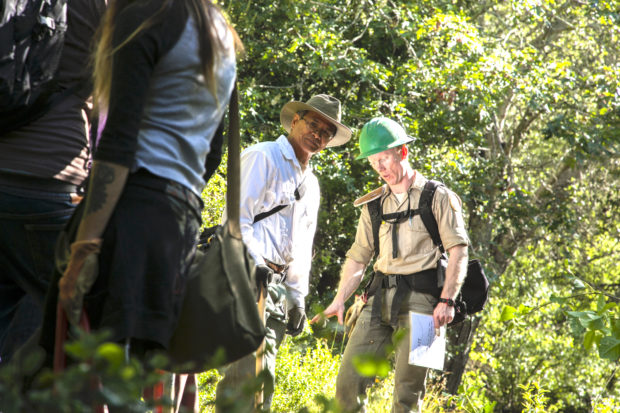
Dee Rosario with Colin Gallagher, a Park Ranger for the East Bay Parks during the cleanup at the Chabot Regional Park during the National Trail Day in Oakland. INQUIRER/Vic Valbuena Bareng
Prospective policy solutions to California’s severe drought are also budding and are rooted in preserving and maintaining the health of water ecosystems. On June 5, 2018, Proposition 68: The California Clean Water and Safe Parks Act was decisively passed by voters. The measure authorizes $4.1 billion in bonds to protect the water and natural areas to ensure that every Californian has access to safe drinking water and safe parks, particularly in low-income, underserved communities.
Prop 68 is the first state park and water bond passed in the last 15 years, and marks a milestone achievement in light of the lack of funding to maintain infrastructure and water conservation projects since the Great Recession.
A Life and Legacy of Public Service
National Trail Day is only one of the community projects that Rosario regularly participates in. Today, he continues a legacy of environmental preservation as a director of East Bay Regional Parks’ Ward 2.
As a member of the legislative and finance committee, Rosario contributes to the execution and decision-making of how the park uses its funds to meet public needs. Priority projects include land acquisition that will lead to the development of public parks throughout the East Bay. The district also offers outdoors education through environmental education centers, mobile naturalist vans that bring aquariums to schools, and a bus express program that subsidizes buses so that schools can come to the parks.
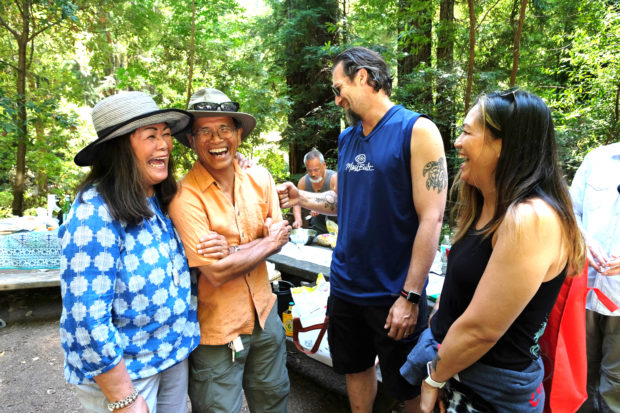
Dee laughs alongside his relatives at their yearly family reunion picnic. INQUIRER/Vic Valbuena Bareng
Rosario attributes his career to the labor union, organizers, and a coalition of women’s groups who fought for increased hiring of women and minorities within the Park District throughout the 1970s. In 1975, Rosario was hired under a diversity outreach program and became an active union member, serving as union steward for 18 years, followed by roles as chief steward, president, and representative of the local executive board for the Alameda County Central Labor Council for 8 years.
His experience with organizing galvanized his commitment to public service, encouraging him to run for office and become the first Asian-American and Filipino American on the Board of Directors for the East Bay Regional Park District.
“People have a passion,” says Rosario. “And for me it’s parks, environmental education. It’s perfect for what I want: to expand that knowledge, and help communities access that knowledge and parks. It’s just something that’s bigger than you, and that’s all you want – you want to provide that for the rest of humanity.”
This photo essay by Vic Valbuena Bareng and text by Debra Tisoy Pacio was created with support from the UCLA Laboratory for Environmental Narrative Strategy’s Ethnic Media Fellowship Program.

